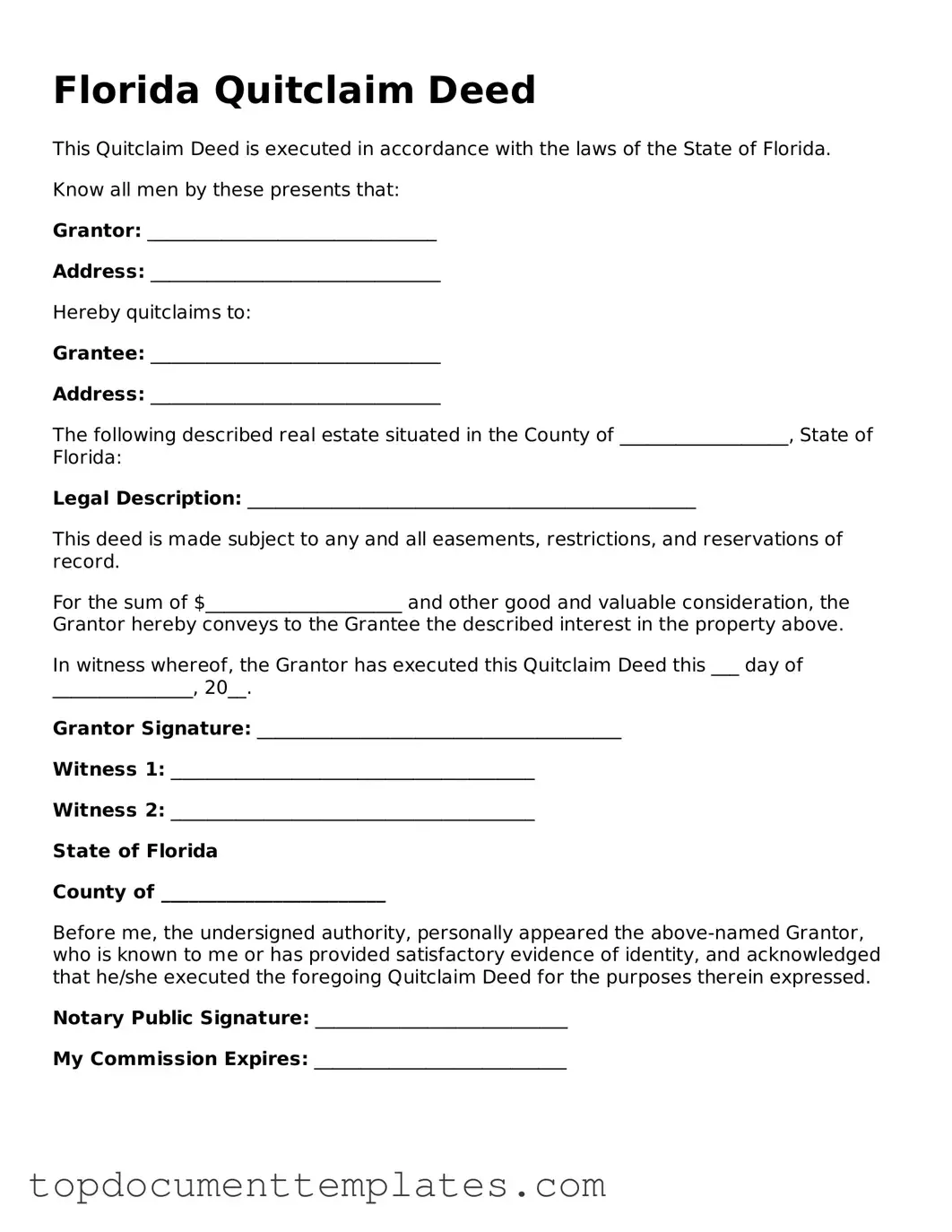Valid Quitclaim Deed Form for Florida State
The Florida Quitclaim Deed form is a vital legal document that facilitates the transfer of property ownership between parties without the need for a lengthy sales process. This form is particularly useful in situations where the transferor, or seller, may not want to guarantee that the title is free of encumbrances, as it does not provide any warranties regarding the property’s title. Instead, it allows the grantor, or the person transferring the property, to convey whatever interest they may have in the property to the grantee, or the recipient. Commonly used among family members, in divorce settlements, or during estate planning, the Quitclaim Deed is straightforward and easy to understand. While it may lack the assurances found in other deed types, such as warranty deeds, its simplicity makes it an attractive option for many. Additionally, the form must be properly executed and recorded with the county clerk to ensure that the transfer is legally recognized, making it crucial for both parties to understand the implications of the deed. With the right information and careful attention to detail, individuals can navigate this process effectively and secure their property interests.
Similar forms
- Warranty Deed: This document transfers property ownership and guarantees that the seller has the right to sell the property. Unlike a quitclaim deed, a warranty deed provides a warranty that the title is clear of any claims.
- Grant Deed: Similar to a warranty deed, a grant deed conveys property ownership. It assures the buyer that the property has not been sold to anyone else and that there are no undisclosed encumbrances.
- Deed of Trust: This document secures a loan with real estate as collateral. It involves three parties: the borrower, the lender, and a trustee. While it does not transfer ownership outright, it establishes the lender's interest in the property until the loan is repaid.
- Bill of Sale: This document is used to transfer ownership of personal property, such as vehicles or equipment. It serves a similar purpose to a quitclaim deed but is focused on personal rather than real property.
- Lease Agreement: This document grants a tenant the right to use a property for a specified period in exchange for rent. While it does not transfer ownership, it does provide rights to the tenant, similar to how a quitclaim deed transfers ownership rights.
Guidelines on Writing Florida Quitclaim Deed
Once you have the Florida Quitclaim Deed form in hand, it's time to fill it out carefully. Ensure that you have all the necessary information ready. This document is essential for transferring property ownership, so accuracy is crucial.
- Start by entering the date at the top of the form.
- In the "Grantor" section, write the full name of the person transferring the property. Include their address.
- In the "Grantee" section, enter the name of the person receiving the property. Make sure to include their address as well.
- Provide a description of the property being transferred. This should include the address and any relevant details like lot number or parcel ID.
- Indicate the consideration amount. This is the value of the property or the amount paid for the transfer.
- Sign the form in the designated area. The signature should be that of the Grantor.
- Have the signature notarized. A notary public must witness the signing.
- Finally, submit the completed form to the appropriate county clerk's office for recording.
File Information
| Fact Name | Description |
|---|---|
| Definition | A quitclaim deed is a legal document used to transfer ownership of real estate from one party to another without any warranties or guarantees. |
| Governing Law | The Florida Quitclaim Deed is governed by Florida Statutes, specifically Chapter 689, which outlines the requirements for property conveyance. |
| Use Cases | This type of deed is commonly used between family members, in divorce settlements, or to clear up title issues. |
| Requirements | To be valid, the quitclaim deed must be signed by the grantor (the person transferring the property) and must be notarized. |
| Recording | While not mandatory, it is advisable to record the quitclaim deed with the county clerk's office to provide public notice of the ownership change. |
| Limitations | Since quitclaim deeds do not guarantee clear title, the grantee assumes the risk of any existing liens or claims against the property. |
Other Popular Quitclaim Deed State Forms
Quit Claim Deed Iowa - It reflects a good-faith transaction rather than a legal guarantee of clear title.
Arizona Quit Claim Deed Form - It is prudent to document the terms of the agreement along with the quitclaim deed.
Quit Claim Deed Ga - Individuals can use a quitclaim deed to resolve ownership disputes amicably.
